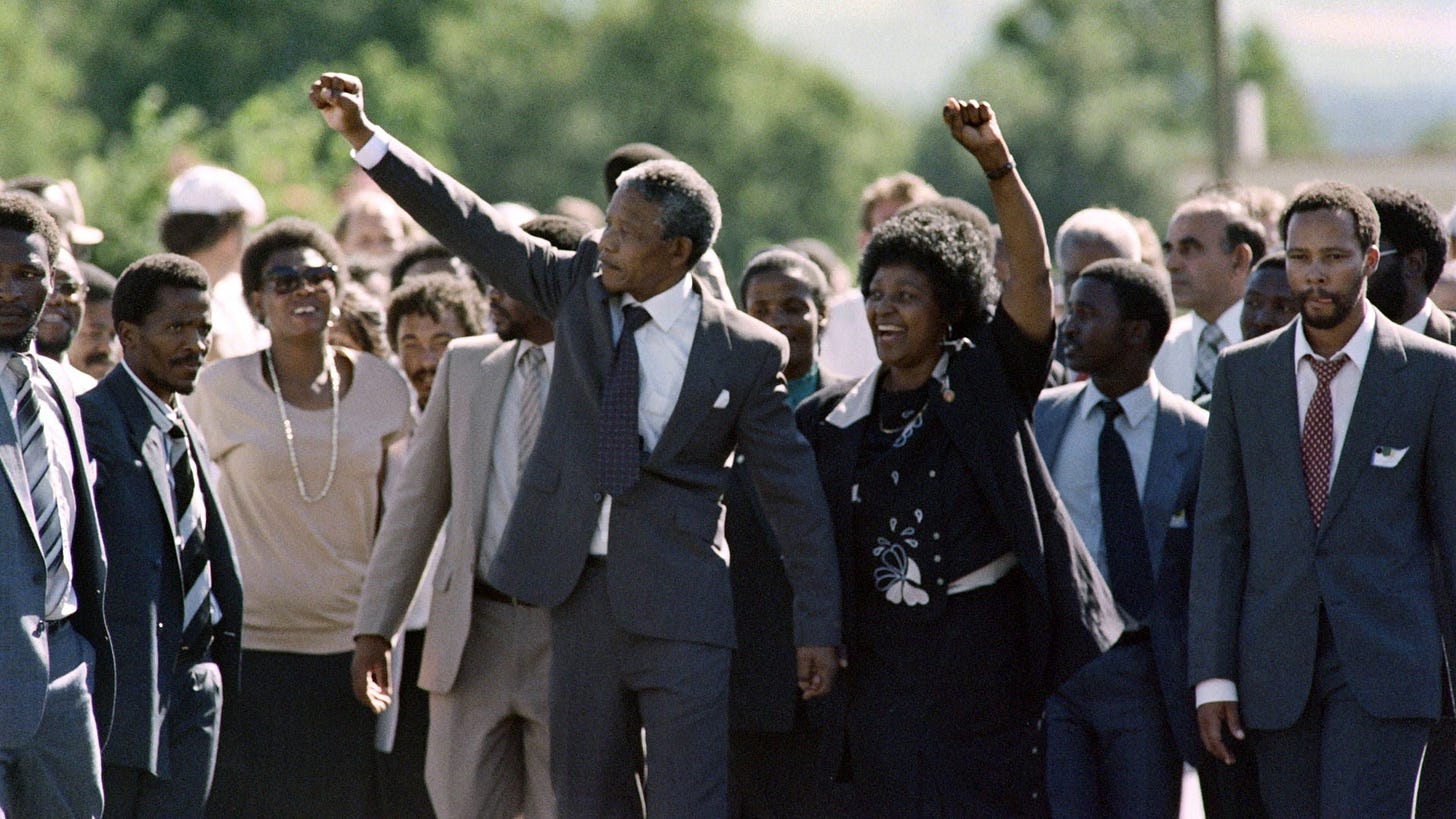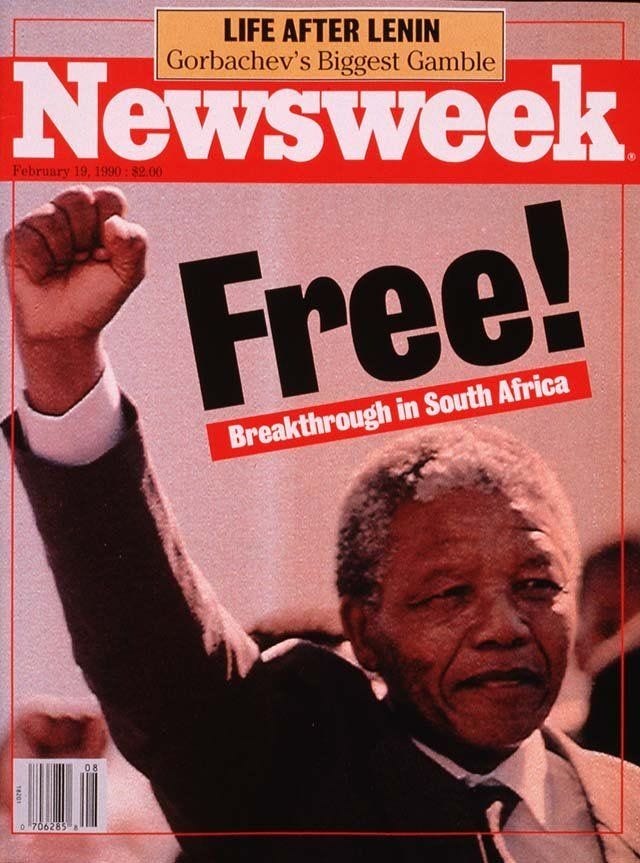February 11 - From Prison to Presidency: Nelson Mandela's Release
Transformative Leadership Through Reconciliation and Peace
This is the day Nelson Mandela was released from prison in 1990, marking a pivotal moment in South Africa's struggle for freedom and equality.
In today's devotional, we will explore the remarkable journey of Nelson Mandela and the profound lessons it holds for Christian leadership. How does Mandela's transition from prisoner to president reflect transformative leadership grounded in Christian values? What can we learn from his example about humility, patience, and love in our own leadership roles?
"Be completely humble and gentle; be patient, bearing with one another in love." - Ephesians 4:2 (NIV)
This Date in History
On February 11, 1990, a pivotal moment in world history unfolded as Nelson Rolihlahla Mandela, the anti-apartheid revolutionary and leader of the African National Congress (ANC), emerged from the gates of Victor Verster Prison near Cape Town, South Africa. After enduring 27 long years in various prisons, his release was a monumental event, not just for South Africa but for the entire world, symbolizing a decisive step toward dismantling the brutal regime of apartheid.
A lifelong struggle against racial segregation and oppression marked Mandela's journey to that day of freedom. Born in 1918 in the Eastern Cape of South Africa, Mandela was deeply affected by the suffering and injustice he witnessed against black South Africans from a young age. His political involvement intensified in the 1940s when he joined the ANC, an organization committed to ending apartheid and achieving equal rights for all South Africans through peaceful protests and civil disobedience.
However, the Sharpeville Massacre in 1960, where South African police killed 69 peaceful protestors, marked a turning point. The ANC was banned, and Mandela, realizing that nonviolent protest alone would not end apartheid, co-founded the militant Umkhonto we Sizwe (Spear of the Nation). He led a campaign of sabotage against government and military targets, which ultimately led to his arrest in 1962.
During his imprisonment, Mandela became a global symbol of resistance to apartheid. His refusal to compromise his political position in exchange for freedom resonated worldwide, drawing international attention and condemnation of South Africa's apartheid policies. Despite the harsh conditions inside the prison, Mandela continued to be a leader and a source of strength for his fellow inmates, upholding his ideals of democracy and equality.
The 1980s saw increasing domestic and international pressure on the South African government to release Mandela and negotiate an end to apartheid. Inside the country, mass protests, strikes, and unrest signified the people's demand for change. Internationally, governments and organizations imposed economic sanctions and boycotts against South Africa, significantly impacting its economy.
Finally, in the face of mounting pressure, South African President F.W. de Klerk, who had begun to dismantle apartheid legislation, announced Mandela's release. Mandela's walk to freedom was broadcast live across the world. As he stood beside his then-wife Winnie, his raised fist became a powerful symbol of resilience and hope. His release signaled the beginning of a new chapter for South Africa, marked by the negotiations to end apartheid and pave the way for democratic elections.
Following his release, Mandela's leadership took on a new dimension. He led the ANC in negotiations with the South African government, which resulted in the first multiracial elections in 1994. Mandela, elected as South Africa's first Black president, focused on reconciliation, nation-building, and forging a new identity for the country. His government tackled the immense challenges of inequality, poverty, and the legacy of apartheid, striving to create a society founded on equality and human dignity.
Mandela's post-release efforts laid the foundation for the 'Rainbow Nation,' a term coined to describe post-apartheid South Africa's ethnic diversity. His presidency and the subsequent leadership transition marked one of modern history's most remarkable periods of peace and reconciliation. Mandela retired from politics in 1999 but remained an active and respected global advocate for peace, human rights, and social justice until he died in 2013.
Nelson Mandela's release from prison is not just a story of a man regaining his freedom but a testament to the enduring human spirit's capacity for resilience, forgiveness, and profound transformation. It reminds us of the power of steadfast determination in the face of seemingly insurmountable odds and the transformative impact one individual can have on history.
Historical Context
South Africa's apartheid system, established in 1948, institutionalized racial segregation and discrimination, ensuring white minority rule while severely restricting the rights of the black majority. The African National Congress (ANC), led by Nelson Mandela, initially pursued peaceful resistance but shifted tactics after the 1960 Sharpeville Massacre, where police killed 69 peaceful protesters. This event led to the ANC's banning and Mandela's eventual imprisonment in 1962, marking the beginning of his 27-year incarceration.
The 1980s brought escalating pressure on the apartheid regime through international sanctions, domestic unrest, and changing global politics following the Cold War. These factors, combined with South Africa's declining economy and growing internal opposition, compelled President F.W. de Klerk to initiate reforms. Mandela's release in 1990 became a defining moment that set in motion negotiations to end apartheid and establish democratic elections, culminating in his historic presidency in 1994.
Did You Know?
An intriguing fact about Nelson Mandela's imprisonment is that during his time at Robben Island, he and other inmates would secretly pass a copy of William Shakespeare's complete works among themselves. Mandela's favorite passage was from Julius Caesar, reflecting on resilience and the inevitability of change: "Cowards die many times before their deaths; The valiant never taste of death but once."
The international campaign for Mandela's release included the 1988 Nelson Mandela 70th Birthday Tribute concert at Wembley Stadium, watched by 600 million people worldwide.
During his imprisonment, Mandela learned Afrikaans, the language of his captors, believing it would help him better understand and eventually negotiate with them.
The prison number 46664 assigned to Mandela at Robben Island later became the name of his HIV/AIDS awareness campaign, reaching millions globally.
Before his release, Mandela was secretly moved to Victor Verster Prison in 1988, where he lived in a warder's house and was allowed to receive visitors, helping prepare him for freedom.
Today’s Reflection
In reflecting upon the theme of transformative leadership, exemplified by Nelson Mandela, we find a profound alignment with the Christian call for leaders to effect significant and positive change within their communities and the world. Mandela's life and his journey from a prisoner to a president encapsulate the essence of transformative leadership—a leadership that not only changes systems and structures but also hearts and minds.
The Scripture, "Be completely humble and gentle; be patient, bearing with one another in love" (Ephesians 4:2), mirrors Mandela's approach to leadership. His humility, even after enduring nearly three decades of unjust imprisonment, his gentle yet firm resolve in the face of formidable challenges, and his patient, inclusive vision for a new South Africa all resonate with these Biblical principles. Mandela's life teaches us that true leadership is not about wielding power but empowering others, a concept deeply rooted in Christian teachings.
The parallels between Mandela’s journey and the Christian experience are striking. Just as Mandela emerged from the literal confines of prison to lead a nation toward freedom and reconciliation, Christians are called to emerge from the spiritual bondage of sin and lead lives that reflect God's love and grace. Mandela's leadership was not characterized by retribution but by a relentless pursuit of reconciliation, echoing the Christian imperative to forgive and seek peace.
Furthermore, Mandela's ability to inspire hope amid despair, to remain steadfast in his convictions despite overwhelming odds, and to envision a future beyond the apparent hopelessness of his situation aligns with the Christian belief in the redemptive power of faith. Christians are called to be beacons of hope in a broken world, much like Mandela was for South Africa and the world.
Practicing transformative leadership in the Christian context involves not just leading others but also transforming oneself. Mandela’s transformation during his years of imprisonment—from a militant revolutionary to a statesman advocating for peace and reconciliation—parallels the transformative journey Christians undergo through faith. This transformation is not a passive process but an active engagement with the world, seeking to bring about change in accordance with God’s will.
In practical terms, Mandela’s example challenges Christians to consider how they can be agents of change in their own contexts. Whether in a family, a community, a workplace, or a nation, the principles of humility, patience, love, and a commitment to justice and reconciliation are universally applicable. Christians are called to lead by example, demonstrating the love of Christ in their interactions and decisions and working towards a world that reflects the Kingdom of God.
In conclusion, Nelson Mandela's life and leadership provide a powerful illustration of the impact one individual can have when guided by principles that resonate deeply with Christian teachings. His story calls all believers to embrace transformative leadership in their lives, leading with humility, patience, and love and striving for a world marked by justice, peace, and reconciliation.
Practical Application
Reflect on your own community or workplace and identify areas where transformative leadership can make a difference. Consider how you can apply principles of humility, patience, and love in these settings. Take time this week to initiate a conversation or an action that embodies these values, aiming to foster a more inclusive, understanding, and equitable environment.
Closing Prayer
Dear Lord, guide us to embody the principles of transformative leadership in our lives, inspired by the example of Nelson Mandela and grounded in Your teachings. Help us to lead with humility, patience, and love, and to seek not just personal success, but the betterment of our communities and the world. Amen.
Final Thoughts
The story of Nelson Mandela's transformative journey from prisoner to president is a powerful reminder of the impact one can have when guided by principles of humility, patience, and love. His legacy challenges us to consider how we can embody these values in our lives and leadership roles, always striving to serve others and foster positive change.
Community Engagement
I love hearing from readers each day. Don’t worry, this isn’t a test—I promise! Feel free to drop a line or two in the comments below. You can answer one of the following questions, share your own reflections, pose a new question, or simply say hello. I can’t wait to hear from you!
How does Mandela's story inspire you in your daily life?
In what ways can we practice humility and patience in challenging situations?
What does transformative leadership look like in a Christian context?
Reflect on a time when you had to lead with love and understanding.
In tomorrow's devotional, we'll delve into the profound echoes between an iconic work of art and our spiritual journey. Discover how the silent cry of a painting can speak volumes about our search for meaning and redemption.








Jason, I’ve been following you for a few months now and I really enjoy your posts. This one popped up today via email after today’s read.
Nelson Mandela (A Marxist communist)and his wife Willie the 2nd of 3 wives used “necklacing” on their opponents. Not quite the right example for Christian’s.